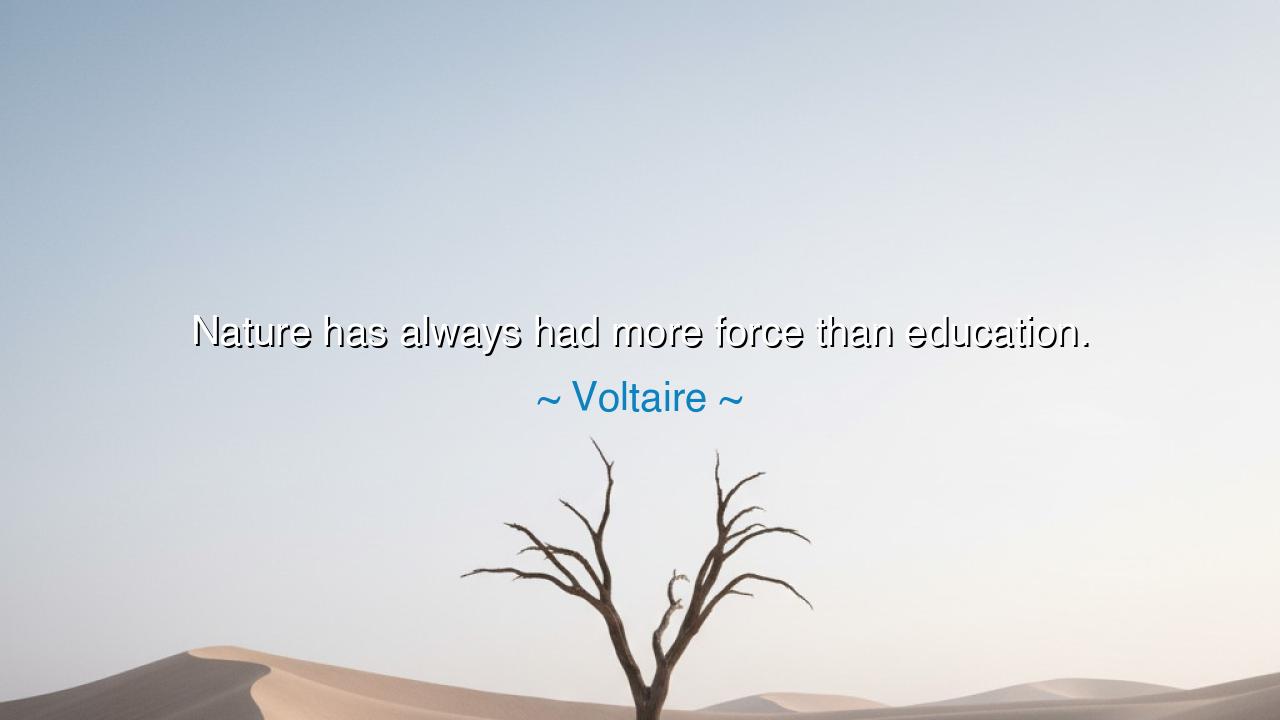
Nature has always had more force than education.






The great philosopher Voltaire, the voice of reason in an age of revolution, once declared: “Nature has always had more force than education.” These words, though simple, resound with the weight of centuries of human experience. In them, Voltaire speaks not only of the struggle between instinct and instruction, but of the eternal tension within the human soul—the conflict between what we are born with and what we are taught to be. His words are both warning and revelation: that while education can refine the mind, nature—the raw essence of our being—remains the greater power, the fire that no schooling can fully tame.
To understand Voltaire’s meaning, we must first understand the world that shaped him. Living in eighteenth-century France, an age of enlightenment and upheaval, he saw the rise of education, science, and reason as mankind’s great hope for progress. Yet, in all his wisdom, Voltaire also saw that human nature—our passions, our pride, our cruelty—often defied the lessons of civilization. Empires built on intellect still fell to greed; kings educated in philosophy still waged unjust wars. Thus, he concluded that nature—the primal essence within every human being—possesses a strength that even the finest education cannot easily overcome.
Voltaire’s insight is both humbling and profound. For though education can illuminate the mind, it cannot always restrain the impulses of the heart. A man may study ethics and still fall to temptation; a nation may teach peace and still breed hatred. The forces of nature—instinct, desire, survival—are the foundation of life itself, and like the roots of an ancient tree, they run deeper than the cultivated branches of knowledge. This is not to deny the power of education, but to remind us that knowledge alone is not virtue, and learning without self-mastery is a fragile crown upon a storm.
History offers countless lessons in this truth. Consider the tale of Dr. Jekyll and Mr. Hyde, the creation of Robert Louis Stevenson centuries after Voltaire, yet echoing his philosophy perfectly. Dr. Jekyll, the learned man, a scholar of morals and medicine, sought to separate his goodness from his darker desires. Yet when he did, nature proved the stronger. His alter ego, Mr. Hyde, the embodiment of unrestrained instinct, grew in power until he devoured the man who had created him. The story is an allegory of humanity itself—our ceaseless struggle to balance the wisdom of education with the force of nature within.
And yet, there is not only danger but divinity in nature’s force. Voltaire did not condemn nature; he revered it. He understood that the same power that drives destruction also gives rise to creation. The instinct to survive births courage; the passion for life births art. The child’s curiosity, the poet’s longing, the mother’s love—all these spring not from education, but from nature’s untaught grace. Education refines these instincts, giving them form and purpose, but it is nature that breathes life into them. Without nature, learning is lifeless; without education, nature is blind. The two must exist in harmony, each shaping the other.
In his wisdom, Voltaire’s words remind us that the goal of education is not to destroy nature, but to elevate it. The wise teacher does not silence instinct, but guides it; the enlightened student does not reject passion, but purifies it. For the fire of nature must burn—but it is education that must shape its flame into light rather than destruction. This balance is the essence of wisdom: to feel deeply, yet think clearly; to act with instinct, yet live with understanding.
The lesson, then, is timeless: Know your nature, and master it through education—but never seek to extinguish it. The instincts that dwell within you are not enemies of learning, but its foundation. To deny them is to deny your humanity; to discipline them is to become truly wise. Just as the river gains its power from its wild source but finds its beauty in its course, so too must the human spirit channel its natural force through the guidance of education.
So let Voltaire’s words echo in the hearts of all seekers of wisdom: “Nature has always had more force than education.” Let them remind us that no lesson is greater than self-awareness, and no knowledge more vital than understanding the power that flows within us. Let us learn not to suppress the wildness of the heart, but to teach it harmony; not to fear our instincts, but to direct them toward creation rather than destruction. For when nature and education walk hand in hand—one fierce, the other wise—humanity rises to its highest form, and the world becomes not a battlefield of impulses, but a symphony of purpose and grace.






AAdministratorAdministrator
Welcome, honored guests. Please leave a comment, we will respond soon